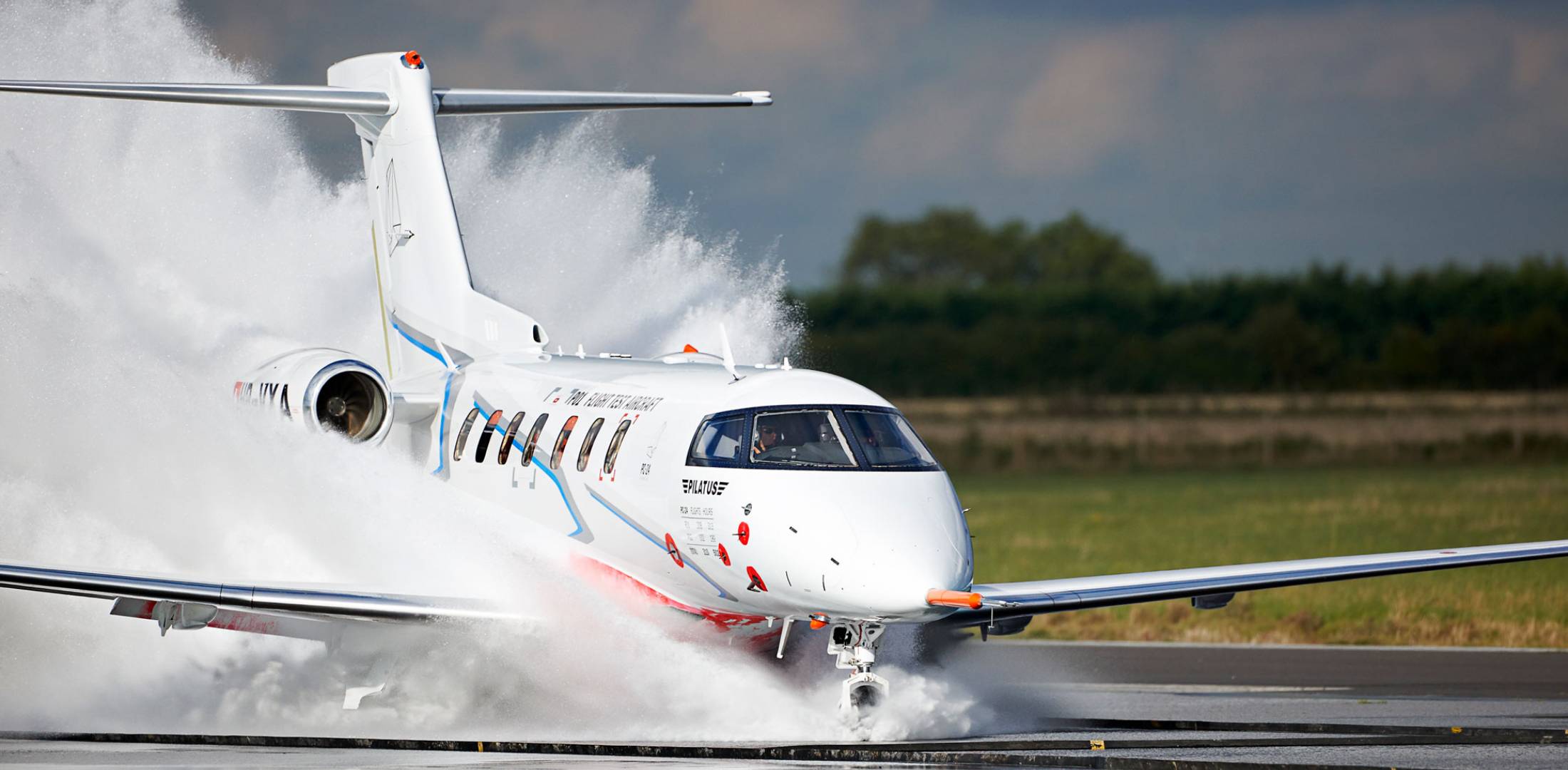I was reviewing the limitations section of the Pilatus PC-24 flight manual before my evaluation flight for this pilot report. Maximum ramp weight: 18,400 pounds. Maximum takeoff weight: 18,300 pounds. Useful load: 6,880 pounds. Maximum pothole depth 1.37 inches (35 mm) with a maximum diameter of 39 inches, and maximum grass height three inches. Potholes, grass height? When was the last time you had to consider the size of potholes or grass height on runways when flying a jet? Unless you are flying a PC-24, it probably never crossed your mind.
I was at Boise Air Terminal with Pilatus v-p Tom Aniello, Phil Winters, v-p of Western Aircraft, and Ashley Fredricks, Western’s chief pilot. Western Aircraft, the largest PC-12 and PC-24 dealer, had just received its seventh PC-24, N194PJ, serial number 194, two weeks earlier. Previous aircraft sold by Western have been delivered throughout its sales region, including Alaska where the PC-24 enjoys being in its element, flying on and off unimproved airports in challenging conditions.
Pilatus Aircraft, known for a variety of turboprop designs including the PC-12, has been a privately held company since inception. The PC-24 was a big leap for Pilatus, not only a turbofan-powered twinjet but a truly unique airplane, one that would resonate not only with dedicated PC-12 owners but with performance and cabin features that aren’t found in other light jets. As with its other projects, Pilatus financed the PC-24 development internally.
Pilatus developed the PC-12 to be a utilitarian aircraft to support the needs of the Royal Canadian Mounted Police and the Royal Flying Doctor Service in Australia, among others. Originally it wasn’t intended to be an executive transport but now it is well known for that function. The PC-24 would have to support all those uses from the start, just faster and higher. That meant it had to have a large cabin, a cargo door as big as the PC-12, operate on the same runways—paved or not—and be certified for single-pilot operations.
The first production PC-24 was delivered to fractional operator PlaneSense in January 2018 and the second and third to Western Aircraft the following month.
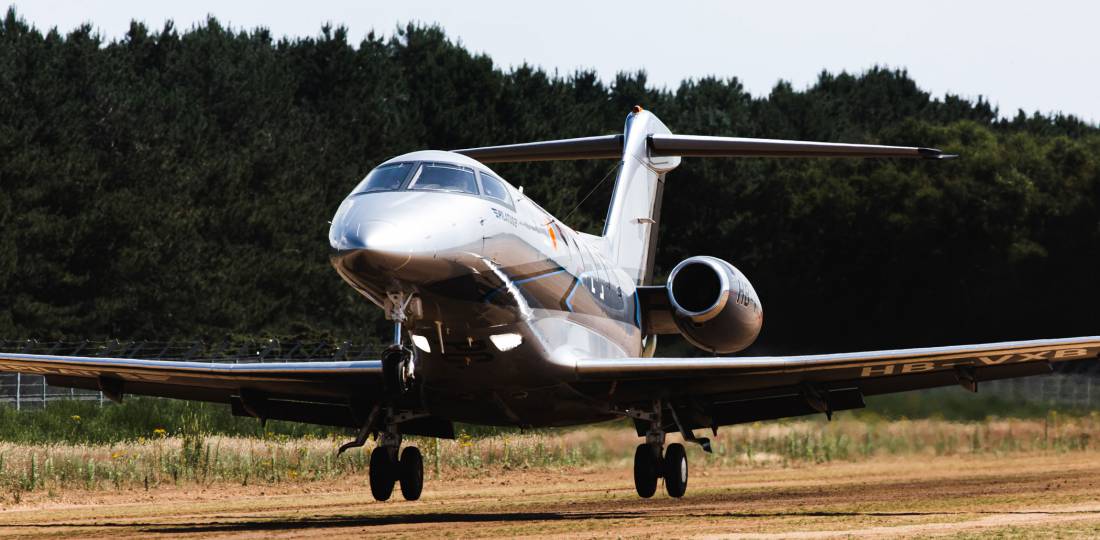
The Super Versatile Jet
N194PJ is typically-equipped with six executive passenger seats plus two lighter-weight commuter seats (easily removed for more cargo space) and most of the available upgrades including Gogo Avance L3 connectivity with a price of $11.623 million.
I wanted to explore as much of the jet’s operating envelope as possible. We planned a mission that would take us from Boise to Sun Valley Idaho, then to Pendleton, Oregon before returning to Boise. Along the way I wanted to evaluate the high-altitude handling, fly various approaches, including single-engine, and end with a short-field landing. While the weather precluded unimproved runway operations, we would be able to evaluate short-field performance back in Boise.
The PC-24 sits tall on the ramp. The empennage rises 17.25 feet above the ramp, the wings span nearly 56 feet and the jet is 55 feet long. With a pointed nose, slightly swept wings (with five different airfoil shapes), large windows in the cabin and flight deck, it appears ready to leap in the air.
The first item on the preflight is connecting the two 44-amp/hour NiCad batteries. Battery #1 is in the nose and battery #2 is aft. Lithium-ion batteries will soon be an option on new PC-24s and retrofittable on aircraft after serial number 184. The airstair door is large and this jet has the optional stair lighting, which is a useful addition providing a welcoming entry, especially in the dark.
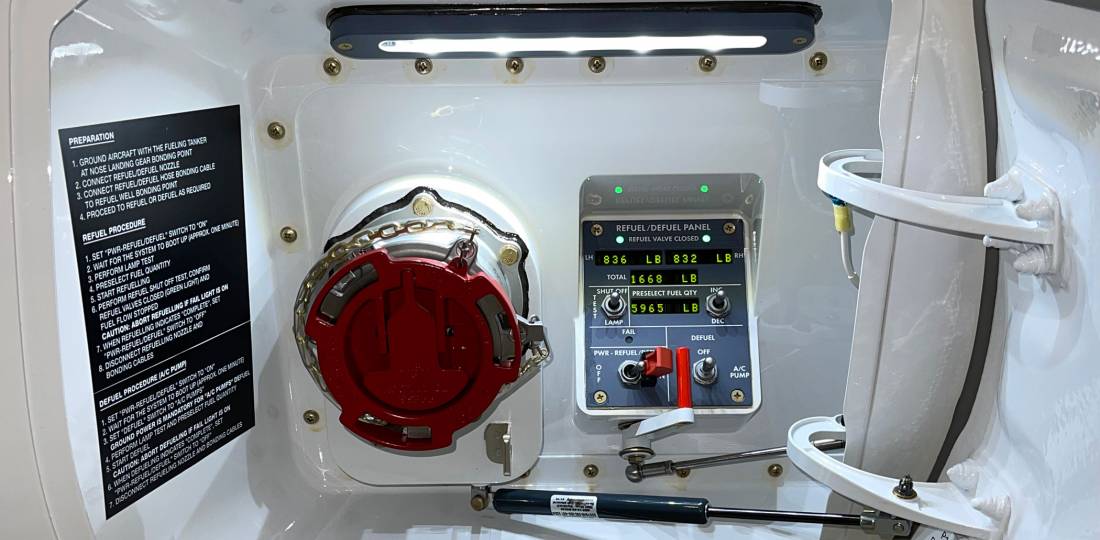
The low-pressure nose tire (58 psi) has a pronounced chine design to deflect water or debris from the engine intakes. The tire’s beefy size makes it look like it would be equally at home on an off-road vehicle, by design. The nose gear has tell-tale wedges to indicate whether the towing turn limits have been exceeded, causing potential damage, an ingenious idea.
In addition to battery #1, the left nose compartment houses several circuit breakers, while the right contains the oxygen tank, remote avionics rack with cooling fans, electronic circuit breaker control unit, and other equipment. The cooling fans’ location cuts down on noise in the flight deck, eliminating the need for fans behind the instrument panel.
On each side of the nose are sensors for airspeed, outside air temperature, angle-of-attack, and ice detection. Just forward of the right wing is the lavatory service panel. The PC-24 has a vacuum-operated toilet, unique in its class, which uses clear water as the wash fluid and is externally serviced.
The right wing is clear of any vortex generators and milled from a single piece of aluminum then chemically milled to various thicknesses along its span. Likewise, the ribs and spar are also milled from aluminum billets. With five different airfoil shapes, Pilatus has designed a wing that can fly at 440 knots and stall at 82.
Inspection of the bleed-air-operated leading edge deicing system reveals numerous exhaust vents underneath. The PC-24 has pneumatic deice boots on the trimmable stabilizer, and no deicing is necessary on the ventral fin. With ice detectors, the ice protection system normally operates in automatic mode, and the associated systems are deployed as necessary. This is another feature that reduces pilot workload.
The PC-24 has two multifunction spoiler panels on each wing that serve as airbrakes and lift dump, as well as roll assist with flaps at eight degrees or greater. When the airbrakes are active, pitch trim compensates automatically to some degree. The air brakes also deploy automatically at Mach 0.751—above the Mmo of 0.74—to slow the jet. Two additional ground spoilers aid in lift dump. Lift dump is automatically deployed upon landing and for rejected takeoffs.
The main dual-wheel landing gear is substantial and clearly designed for unimproved fields with low-pressure tires (73 psi) and anti-skid steel brakes on each wheel. The dual-wheel trailing-link gear is set back fairly far so that any debris is thrown free of the substantial double--slotted flaps, reducing potential damage. An optional gravel kit, required for gravel runways, with a nose wheel skirt or underwing protective film is also available. Flaps, gear, and all lift-dump devices are electric, only the brakes are hydraulically operated, eliminating the weight and complexity of a redundant hydraulic system.
The PC-24 has single-point refueling, running on the hot battery bus, with a maximum fuel capacity of 5,964 pounds.
The next step was checking the Williams International FJ44-4A-QPM engines, each producing 3,420 pounds of thrust and mounted high to reduce FOD ingestion. The engines have a TBO of 5,000 hours. The Quiet Power Mode (QPM) is available on the right engine, allowing it to serve as an APU, without the cost, weight, and maintenance of a separate unit. In QPM mode the engine idles lower with concomitant lower fuel consumption to power all systems including cabin cooling and heating. This is ideal when flying the PC-24 in a remote area, with no GPU available, to keep the airplane cool or warm.
Williams International designed an integral bleed air precooler for the engines, eliminating the need for a drag-inducing precooler inlet on the engine pylon.
Inspecting the exhaust nozzle, the engine designers came up with a clever idea to extract more downward thrust at the lower speeds during initial climb, using the Coanda effect. You observe the Coanda effect when pouring water slowly out of a glass. The fluid, in this case water, curves around the lip instead of pouring out cleanly. The PC-24 has an extended top edge on the exhaust nozzle—Williams calls this the Exact nozzle—that uses this effect to deflect the thrust two to three degrees upward, thus providing additional down force after takeoff, which boosts the climb. This is especially useful for short-field performance. As the PC-24 accelerates, the Coanda effect is no longer applicable and all of the thrust vector is directly aft.
On the left empennage is the signature cargo door, 4.25 by 4.08 feet and electrically-operated. I’ve used this easy access on my disaster relief flights in the PC-12 to load patients and a donated X-ray machine with a fork lift. The flexibility to have this same capability in a jet is incredible, let alone making everyday cargo loading easier. This is also a useful feature to load, and unload up to two patients head-first on the air ambulance version of this versatile jet.
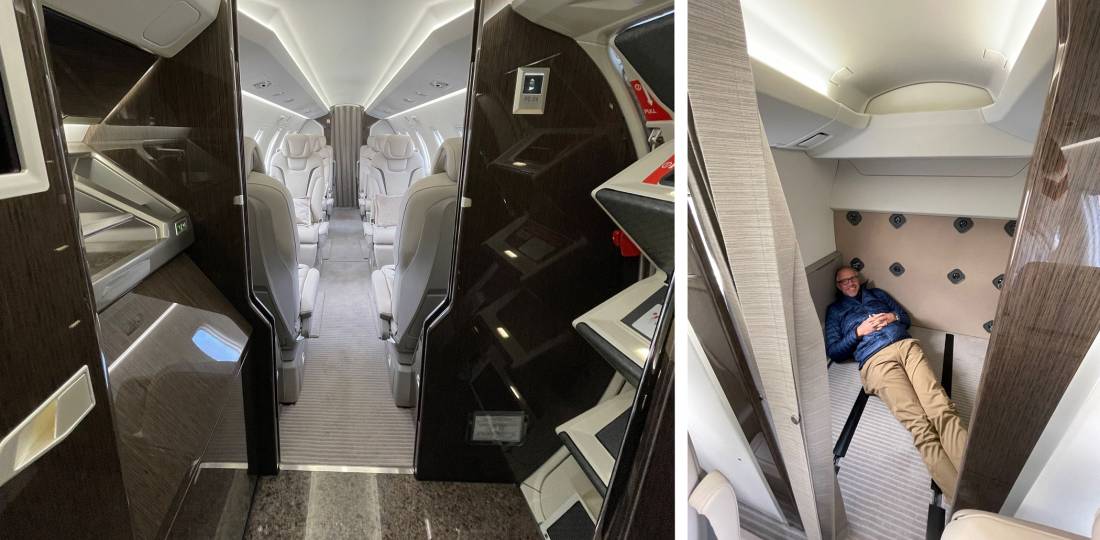
Cabin Features
The PC-24 entry, through the 2.1- by 4.2- foot airstair door, is impressive. Western Jet chose the optional granite-surface entryway, which is practical for this high-wear area and good looking as well. The entry is also the location of the galley, lavatory, and sink. The lavatory has two solid sliding doors, with the toilet deployed from the side cabinet with the touch of a switch. One advantage of a forward lavatory is the flexibility it provides the operator to select multiple passenger and cargo options for the cabin. Pilatus is certifying an aft toilet as an option soon.
Just behind the pilot on the left is a storage cabinet and also the optional galley with a 115 VAC outlet, to power your favorite brewing device. If you would like to cook on board, or make popcorn, an optional microwave is available.
The 501-cu-ft flat-floor cabin, including the 90-cu-ft cargo area accessible during flight, is 23 feet long, 5.1 feet high, and 5.6 feet wide. This is two inches taller and six inches wider than the Phenom 300E and Learjet 75, and nine inches wider and three inches taller than the Cessna Citation CJ4. The standard configuration includes six executive seats, with options for up to eight seats in various arrangements. This PC-24 has eight executive seats, each with excellent legroom. Operators can choose from a large number of seating options, including 10-seat commuter, air ambulance, special missions, and at least five executive configurations.
Cabin environment control is via Pilatus’s Integrated Cabin Management System, using an app to control lighting and temperature or serve media from the 800-GB hard drive. Internet connectivity options include either Gogo Avance L3 air-to-ground or low-speed Inmarsat satcom with BendixKing’s Aerowave 100.
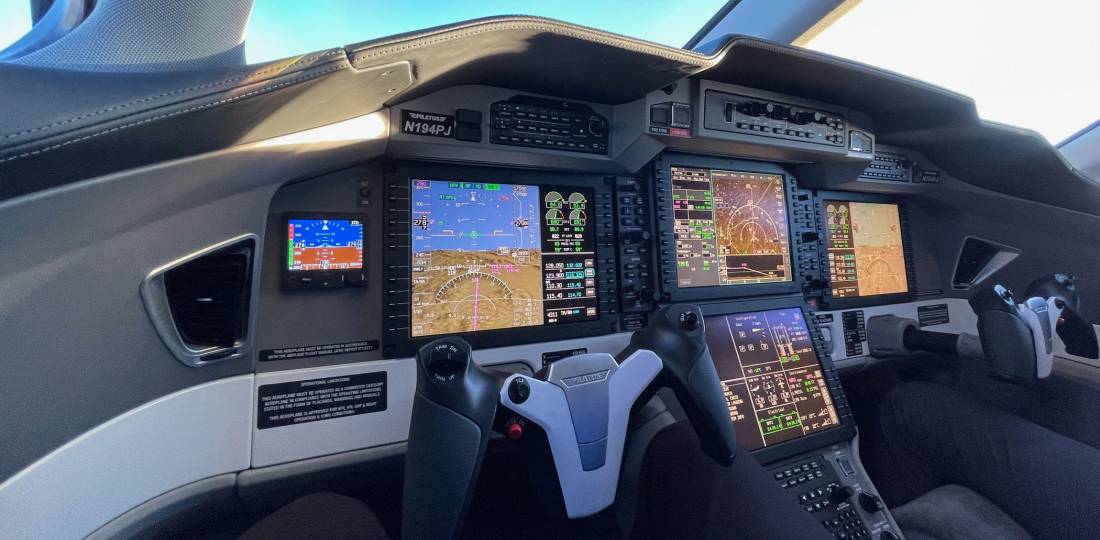
Flight Deck
Every time I enter the PC-24 flight deck I’m impressed. With panel-mounted flight controls, the legroom is spacious. Pilatus named its avionics suite the Advanced Cockpit Environment (ACE), a version of Honeywell’s Epic 2.0 avionics. It is an apt description. The electrical systems (generators, batteries, lighting) and engine start controls are on the overhead console. The expansive front panel contains three high-resolution 12-inch displays: two primary flight displays (PFDs), and one multifunction display (MFD). The center console has another MFD as well as the keyboard, cursor control device (CCD), anti-/deice controls, and the power control levers, airbrakes, and controls for flaps and trim. The autopilot guidance panel is on the glareshield.
The lower MFD has multiple, dynamic windows. One is dedicated to the central advisory and warning system and the others change dynamically in size and content based upon the task at hand. Using the electronic checklist as an example, when on the start engine task, the upper MFD windows that usually display gear and flaps configuration changes to display an engine synoptic. The gear and flaps status moves to a lower window. As you start the engine the synoptic shows the status of the batteries, generator (or GPU), and current flow. Once the engine start is completed, the MFD reverts to the previous configuration, until the next step.
Starting the engines is straightforward. With the power control levers at idle, on the overhead console pull out the right engine start switch, rotate from OFF to RUN then push the START button, and hold for two seconds. After monitoring the engine parameters, with a peak ITT of 534 deg C, the engine idled at 53.4 percent N2 and fuel flow of 156 pph. I asked for the GPU to be disconnected and before starting the left engine, tested the QPM. After selecting the Quiet Mode button on the PFD, the idle decreased to 45.4 percent N2 with fuel flow of 122 pph and the noise level lowered appreciably. With the Quiet Mode disabled, I did the left engine start sequence using the right generator.
The avionics and systems on the PC-24 are sophisticated, no surprise because Honeywell avionics power much larger jets, including modern Falcons and Gulfstreams. For PC-12 NG pilots, the transition to the PC-24 is relatively easy. The avionics may take more time to learn for pilots familiar with Garmin G1000/G3000/G5000 avionics, however, the ACE systems integration and intuitive automation that facilitates single-pilot operation, are amazingly powerful. Mastering these systems is clearly within the ability of a qualified owner--operator or professional pilot.
Pilatus offers a large number of avionics options, including ADS-B In traffic integrating with TCAS II, allowing the pilot to identify and track other aircraft.
Entering the flight plan into the Honeywell FMS is straightforward, using the CCD or wirelessly with the Honeywell Forge app. We were operating as a crew, and Fredricks set our V speeds, calculated using the Pilatus-supplied Guru2 app, and loaded the flight plan for our initial leg from Boise to Sun Valley.
This version of FMS software does not generate the takeoff and landing data, which will be available along with other features in early 2021. A new touchscreen controller, which I’ve flown on the PC-12 NGX, will also be added to production aircraft at that time and can be installed on aircraft starting with serial number 185.
The PC-24 features Honeywell’s Runway Awareness and Advisory System (RAAS) as well as a high-quality 2D airport overlay on the MFD, rather than a simple geo-referenced airport chart. RAAS integrates with the Honeywell EGPWS, monitoring 26 conditions, on the ground or flying. Some of the conditions include correct runway, sufficient length for takeoff/landing, flaps monitoring, long landing, or even lined up to land on a taxiway. In low-visibility conditions, which happens at Boise in the winter, this tool can be extremely useful.
We were cleared for departure on Runway 28L and set TOGA. With brakes released, I wanted to test the autothrottle system so I simply moved the power control levers to vertical and felt the autothrottle servos take over. Fredricks called out V1 at 89 kias, then quickly Vr at 92 kias. I rotated the nose up to the command bars. The PC-24’s flight director is intelligent; the initial pitch for climb is six degrees which progressively increased over the next 14 seconds to 15 degrees. Our initial climb rate was 3,200 fpm at 130 kias. Positive rate, gear up, then quickly flaps up. At these speeds, the Coanda effect as a result of the Williams Exact exhaust nozzle design results in slight vectored thrust for the climb.
Selecting flight level change (FLC) mode, the autothrottle reduced power to maximum continuous thrust and adjusted the FMS-based speed to 170 kias, increasing to 200 kias for a cruise climb. Quickly climbing through 8,000 feet and in excess of 4,200 fpm, we accelerated to our manually selected speed of 220 kias. We were quickly at our initial altitude of 13,000 on our way to Sun Valley. Hand flying the PC-24, the control feel was comfortable in all axes.
As we prepared for Sun Valley, ATC advised us that the airliners were going missed at Sun Valley with ceilings of 300 feet agl and asked our intentions. With smiles, we said we wanted the RNAV X 31! Nothing is better during a test flight than to have real weather to below minimums. Friedman Memorial Airport is in a mountainous valley and because this PC-24 is certified for LP minimums, we could descend to the lowest MDA of 6,180 feet msl (900 agl), 740 feet lower than the LNAV MDA. I let the autopilot fly the approach with the autothrottle, with speeds adjusting automatically. Our Vref was 99 kias with 33 degrees of flaps.
At JUNOL (IAF) and 8,600 feet msl, I engaged the APR mode of the autopilot and set the missed approach altitude. As we descended on the approach a voice annunciation—“Ice”—came over our headsets. With the ice protection system in automatic mode, it not only activates the anti- and deice system but also activates an aural warning. This is another task I didn’t have to be concerned with flying in IMC. At GUNKS (FAF) our speed was 135 kias, slowing to 105 kias, just above our Vref of 99 kias. At MDA, without the runway environment in sight, I pressed the TOGA button and the autopilot transitioned to the FMS missed approach and the autothrottle advanced to takeoff thrust. I had to do the usual cleanup of gear and flaps and monitor the autopilot. It was the lowest pilot workload approach in IMC to minimums, with a missed, that I’ve flown. On the initial climb we were exceeding 5,000 fpm, with a stabilized climb at 200 kias and 4,000 fpm transitioning to 215 kias/Mach 0.64 and 2,700 fpm at FL350 on our way to FL450.
At FL450 I hand flew to evaluate the handling, including steep turns. The PC-24 is incredibly stable and I found the control pressures to be very reasonable, with only minor adjustments to trim needed in the rarified air. On the first 180-degree turn I deviated up to 60 feet, after that I was able to keep my altitude easily within less than 30 feet. I would like to say the stability was due to my flying, however, the design of the jet made my job easier.
The PC-24 has an emergency descent mode that is activated when on autopilot, above FL300, and the cabin altitude exceeds 10,000 feet msl. The flight director/autopilot enters FLC and the heading moves 90 degrees to the left. The autothrottle sets a speed of Vmo or Mmo, even if the autothrottle is off, and the aircraft descends to 15,000 feet. At that altitude the autothrottle is set to 175 kias, awaiting the next command.
With air work completed, it was time to fly to Pendleton, Oregon, for another approach, this time single-engine. As pilots know, the approach segment of a single-engine instrument approach is not an issue; use the checklist, fly at a higher Vref, and land. The challenge is the single--engine missed approach. That is what I wanted to evaluate.
We were on the ILS 26 at Pendleton and hand-flying the approach, very enjoyable in the PC-24. Fredricks and I had reviewed the missed approach procedure: full power, and with one engine the good engine’s Fadec will engage the automatic thrust reserve, increasing the available thrust by 5 percent on the operating engine. The PC-24 has automatic rudder assist that provides additive rudder input until reaching 1,200 feet agl. You can use the autopilot, but not the autothrottle, for a single--engine approach and missed approach.
At minimums, throttles full forward, pitch up eight degrees, flaps to 15 degrees, positive rate, gear up, and hold almost full rudder. I kept the airplane on runway centerline and after a compliment on the airplane by the tower controller, we were off back to Boise. Later that evening at dinner, Aniello told me it was too bad we didn’t get to do a single-engine missed approach. I replied, “We did,” but he just didn’t feel it in the cabin!
I wanted to explore the short-field capabilities of the PC-24 and planned for Runway 28. We calculated using the Guru2 app a required dry runway distance of 2,139 feet at our 14,000-pound landing weight. If it was wet it only increased to 2,479 feet. For landing on an unimproved runway, each condition (gravel, sand, dirt, grass) has its own requirement. For example, if landing on gravel, maximum rock size is 1.97 inches. If there are ruts, none can be over 3.94 inches. Flaps must be at least 15 degrees.
On approach, we picked taxiway Delta, 2,000 feet from the threshold, for a potential turnoff. Stabilized at a Vref of 92 kias, we were set. Over the runway threshold, power control levers to idle, touchdown, and normal braking, we were basically at taxi speed well before the 2,000-foot mark. The lift dump, comprised of air brakes and additional lift dump panels, automatically deploys upon landing.
Shutdown is simple with the electronic checklist. The after-landing checklist contains items specific to landing on unimproved runways. I guess you look for grass stains when landing on the three-inch grass.
Pilatus’s flight documentation is extremely thorough, with more detail on operating the jet than I’ve seen before, including 26 pages of flight profiles alone. Each unimproved runway operation also has its own document with extensive surface descriptions.
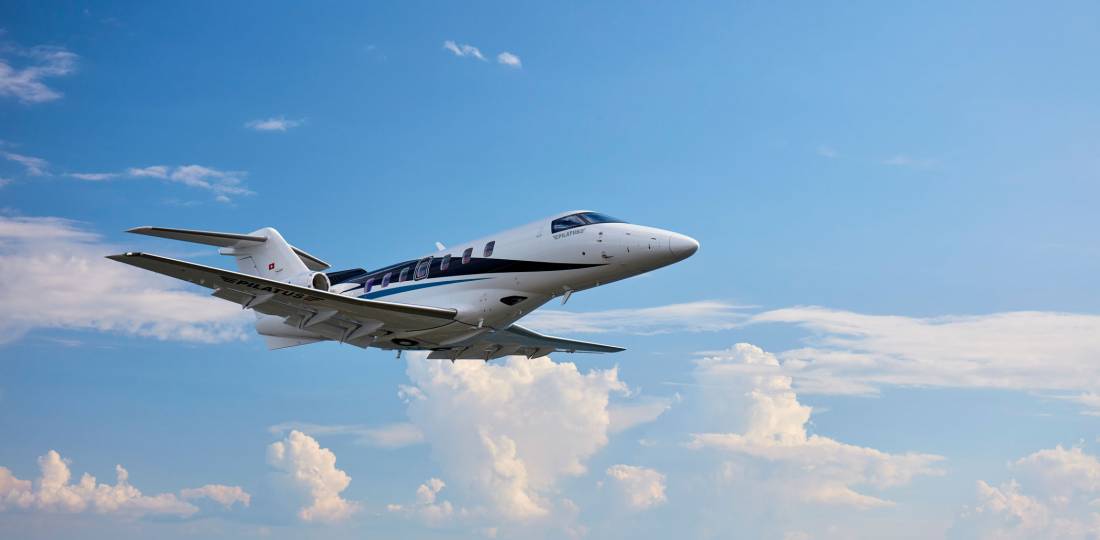
Pilatus Support
Pilatus developed a robust support infrastructure to assist its dealers, which are the primary source of owner and operator assistance. Western Aircraft, for example, has technical support personnel available to provide assistance to customers 24/7.
Pilatus Business Aircraft, a wholly--owned entity of Pilatus Aircraft, is located in Broomfield, Colorado at Rocky Mountain Metropolitan Airport and oversees completion, delivery, and dealer support for North and South America. Because 70 percent of PC-12s and 50 percent of the PC-24s are sold within the Americas, the U.S facility’s support is integral to the success of operators. Pilatus maintains two other central dealer support facilities, one at company headquarters in Stans, Switzerland, and the other in Adelaide, Australia.
The PC-24 comes with a seven-year airframe warranty, three years on avionics, five years for engines, and two years on systems, paint, and interior. Pilatus estimates direct operating costs (labor, parts, engines) at just under $600/flight hour. Warranty coverage can be extended through Pilatus’s CrystalCare program, which includes scheduled and unscheduled maintenance, normal wear and tear, Williams’s Total Assurance Plus Blue engine coverage, service bulletins, the Guru2 app, as well as shipping and a mobile AOG recovery service. The CrystalCare hourly rate varies by annual flight hours, ranging from $828 to $1,300 per hour. Most owners choose this program.
PC-24 Competitors
The PC-24’s closest price competition for new jets are the Cessna Citation CJ4, Embraer Phenom 300E, and Learjet 75. The Learjet 75, certified under Part 25, requires two pilots, while the others are Part 23 certified and require only one pilot. The PC-24 is not the fastest jet in comparison, with a maximum speed of Mach 0.74 while the Phenom 300E is Mach 0.80 and the Learjet 75 Mach 0.81. Maximum payload, including pilot, of the PC-24 is 2,700 pounds, 47 pounds fewer than Phenom 300E at 2,747 pounds and about 500 pounds more than the Learjet 75.
The PC-24 has a larger cabin than these other models and can carry more cargo, along with shorter runway requirements. None of the other jets have a large cargo door like the PC-24’s. When looking at cabin configuration flexibility, the ability to operate on unimproved runways, or fly executives and load cargo with a forklift—on the same flight—there are no competitors. The Pilatus PC-24 is aptly named the Super Versatile Jet.
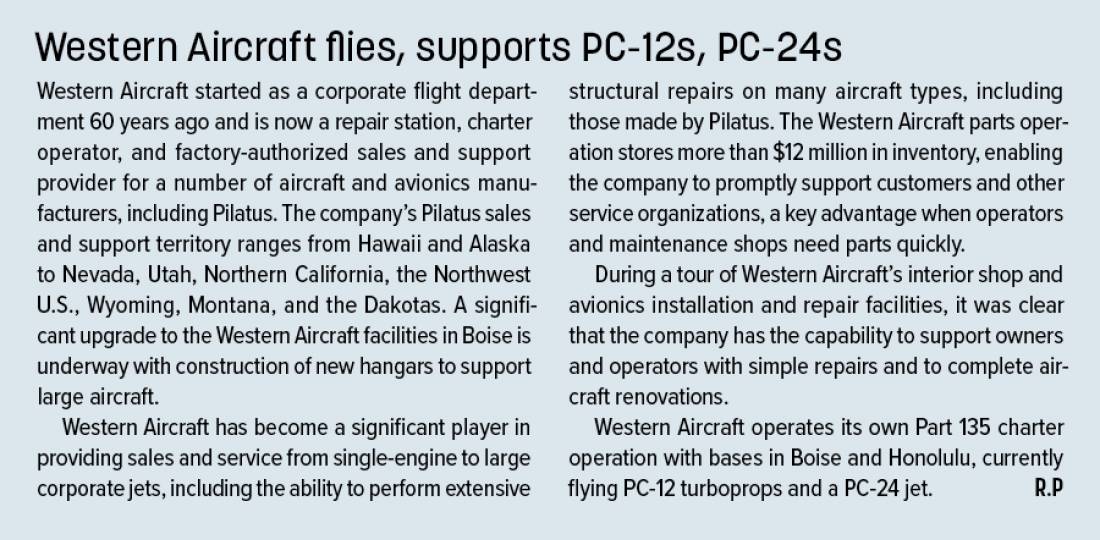
Pilatus PC-24 Specifications and Performance
Base Price: $10.7 million
As Flown: $11.623 million
Engines: (2) Williams International FJ44-4A, 3,420 lbs
Avionics: ACE (Honeywell Epic)
Passengers: (typical) 1 pilot + 9 pax
Range: (NBAA reserves, 4 pax, 200-nm alternate) 2,000 nm at LRC
High-speed cruise: 440 ktas/Mach 0.74
Long-range cruise speed: 375 ktas at 45,000 ft
Fuel capacity: 5,964 lbs
Max payload w/full fuel: 751 lbs
Maximum altitude: 45,000 ft
Cabin altitude at max altitude: 8,000 ft
Max takeoff weight: 18,300 lbs
Balanced field length at mtow: (sea level, standard) 2,930 ft
Landing distance: 2,375 ft
Length: 55.2 ft
Wingspan: 55.75 ft
Height: 17.3 ft
Cabin:
Volume: 501 cu ft
Width: 5.6 ft
Height: 5.1 ft
Length: (seating area) 23 ft
Baggage capacity: 90 cu ft/1,000 lbs
FAA certification: FAR Part 23, Dec. 7, 2017
Number built: 100 (Jan. 4, 2021)
